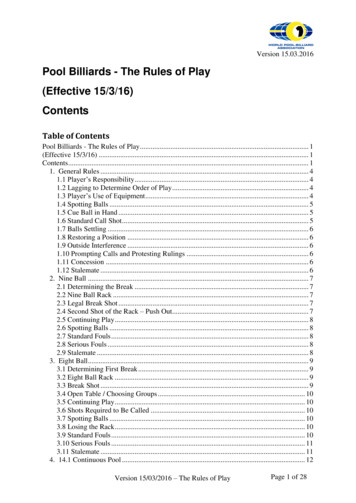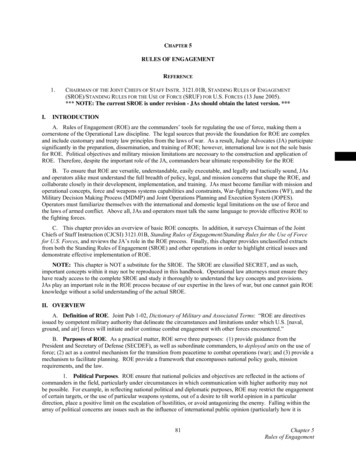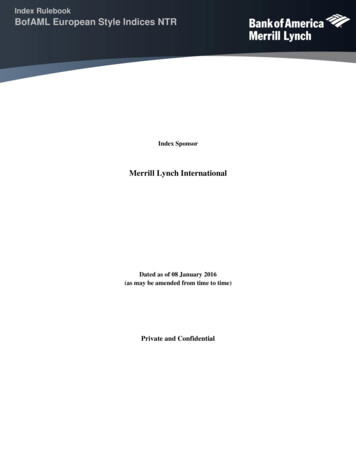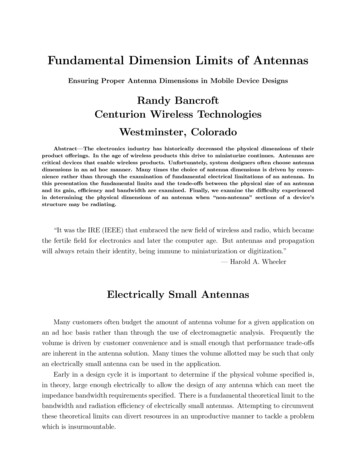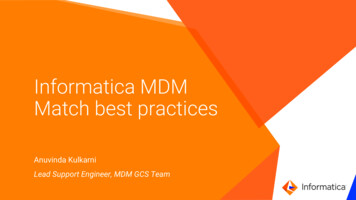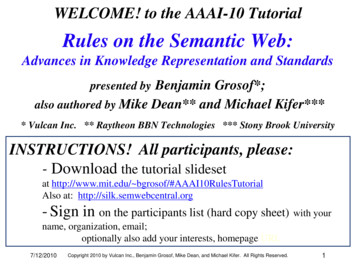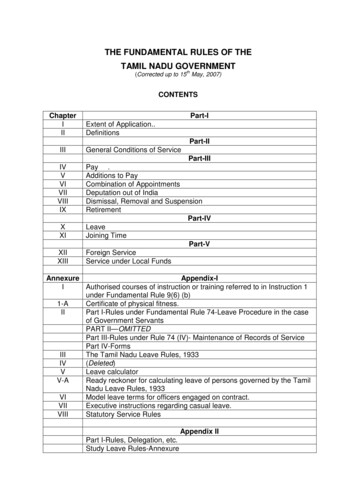
Transcription
THE FUNDAMENTAL RULES OF THETAMIL NADU GOVERNMENTth(Corrected up to 15 May, 2007)CONTENTSChapterIIIPart-IExtent of XIIXIIIGeneral Conditions of ServicePart-IIIPay .Additions to PayCombination of AppointmentsDeputation out of IndiaDismissal, Removal and SuspensionRetirementPart-IVLeaveJoining TimePart-VForeign ServiceService under Local FundsAnnexureAppendix-IIAuthorised courses of instruction or training referred to in Instruction 1under Fundamental Rule 9(6) (b)1-ACertificate of physical fitness.IIPart I-Rules under Fundamental Rule 74-Leave Procedure in the caseof Government ServantsPART II—OMITTEDPart III-Rules under Rule 74 (IV)- Maintenance of Records of ServicePart IV-FormsIIIThe Tamil Nadu Leave Rules, 1933(Deleted)IVVLeave calculatorV-AReady reckoner for calculating leave of persons governed by the TamilNadu Leave Rules, 1933VIModel leave terms for officers engaged on contract.VIIExecutive instructions regarding casual leave.VIIIStatutory Service RulesAppendix IIPart I-Rules, Delegation, etc.Study Leave Rules-Annexure
Forms A to C.Part II-Rulings.Part III-Matters relating to All-India Service Officers, High CourtJudges, etc.THE FUNDAMENTAL RULES OF THE TAMIL NADU GOVERNMENT.PART-I.CHAPTER I—EXTENT OF APPLICATION1. These rules may be called the Fundamental Rules. They shall come into force with effectfrom the 1st January 1922.RULING.The President of the Republic of India and the State Government may, by general or specialorders, permit deviations from any provisions of a purely procedural nature contained in any rulesmade or confirmed under Article 309 of the Constitution of India provided that such deviations shallnot affect the conditions of service, the pay and allowances or the pensions of officers subject to therule-making control of the President of the Republic of India.2. The Fundamental Rules apply, subject to the provisions of Rule 3, to all Governmentservants paid from the Consolidated Fund of the State and to any other class of Governmentservants to which Government may by general or special order declare them to be applicable.The Government may, in relation to service, under their administrative control, other than AllIndia Services, make rules modifying or replacing any of the Fundamental Rules:Proviso deleted (G.O.Ms.No.90 P&AR (FR.IV) dt. 5.7.2003 - w.e.f. 19.3.2003).Note 1.—A Government servant who is paid from the Consolidated Fund of the State and who istemporarily transferred to any of the Defence Services shall remain subject to these FundamentalRules.Note-2.—The Service Rules shall be taken to embody and indicate fully all the provisionsgoverning the services concerned. As laid down in the Service Rules the Fundamental Rules shallgovern a service, only in the matter of leave, leave salary, pension and other such conditions ofservice, as have not been provided for in the Service Rules. If any provision of the Fundamental Rulesis repugnant to any provisions of the Service Rules, then the provisions of the Service Rules shallprevail and the provisions of the Fundamental Rules shall, to the extent of the repugnancy, be void.RULINGS.(1) In cases where the Tamil Nadu Government merely record the orders of Government of Indiaregarding Fundamental Rules, it may be assumed theat the instructions issued by the Government ofIndia will apply to Government servants under the rule-making control of Tamil Nadu Government.(2) The personnel allotted from the former Travancore-Cochin State to the Tamil Nadu State shallbe governed by the Fundamental Rules of the Tamil Nadu Government subject to the protection givenby the proviso to Section 115 of the State Reorganisation Act, 1956 (Central Act 37 of 1956) insupersession of the corresponding rules, if any applicable to them.(G.O.Ms. No.1157, Finance, dated 22nd October 1960.)3. Unless in any case it be otherwise distinctly provided by or under the rules, these rules do not apply toGovernment servants whose conditions of service are governed by Army or Marine Regulations.4. Deleted.5. Deleted.5-A. The Government may relax the provisions of rules or orders in such manner as may appear tothem to be just and equitable provided that where any such rule or order is applicable to the case of2
any person or class of persons, the case shall not be dealt with in any manner less favourable to himor them than that provided by that rule or order.RULINGFundamental Rule 5-A applies only to relaxations in individual cases. General exemptions from thenatural operation of rules can be made only by amendment of the rules by competent authority.6. Government may delegate to any of its officers, subject to any conditions which it maythink fit to impose, any power conferred upon it by these rules with the followingexceptions:—(a)all powers to make rules;(b)the other powers conferred by rules 6,9 (6) (b), 44, 45, 83, 108-A, 119, 121 and127 (c),Delegation under Rule 6.In the case of officers under their administrative control who are on leave in the United Kingdom,the Government authorize the High Commissioner for India to exercise all powers conferred on themunder the Fundamental Rules except those specified in clauses (a) and (b) of Rule 6.7. No powers may be exercised or delegated under these rules except after consultationwith the Personnel and Administrative Reforms Department. It shall be open to thatdepartment to prescribe, by general or special order, cases in which its consent may bepresumed to have been given, and to require that its opinion on any matter on which it hasbeen consulted shall be submitted to the Governor by the consulting Department.Instruction under Rule 7.The previous consent of the Personnel and Administrative Reforms Department required underthis rule to the exercise or to the delegation of the powers conferred under the Fundamental Rules,may be presumed to have been given in all cases except the following:—(1) Proposals involving fresh delegations of powerGovernment.to authorities subordinate to the(2) Proposals for the issue of new Rules or the amendment of existing ones where the powerto make rules has been conferred on the Government, viz., 9 (6)(b), 10, 44, 45, 45-A, 45-C, 47, 66,68,74, 82, 93, 101 to 104, 106, 119 and 130.Note.—All orders issuing new Rules or amending existing ones will be issued in the Personnel andAdministrative Reforms Department.(3) Proposals to issue orders under the following rules, unless covered by the Rules and/orinstructions already issued under them:—Fundamental Rules 9(6)(b), 19,20,27, proviso to Fundamental Rules 22(1)(b)(i), 33, 35, 36,40, when the pay of the temporary post exceeds Rs. 250 or is higher than the minimum allowed for acorresponding permanent post, 44, 45, 45-A, 46 and 47 for honoraria in excess of budget provision orfor which no scales have been laid down and for permitting the acceptance of fees for work doneduring official time or with the use or assistance of Government apparatus, materials, etc.,48-A, when it involves any payment to a Government servant on account of the invention, 49, Note 3under 51, when the pay of the Government servant deputed exceeds Rs. 250 per mensem or thedeputation extends beyond the financial year or when there is no budget provision, 68, 93, 101 to 104,106, 110 to 114 in all cases to which the note 2 under Fundamental Rule 114 applies, 119, 121,127(c) and 130 and Tamil Nadu Traveling Allowance Rules 9, 13, 20, 35, 44 when a class of officersis affected or the conditions of Travelling Allowance Rules 44(1) are not fulfilled; 47 in respect of thegrant of enhanced rates of daily allowance to Groups C and D officers of the Police Departmentdeputed outside the State of Tamil Nadu in connection with the tours of the President of the Republicof India or the Prime Minister of India, 54 and 88.3
8. The power of interpreting these rules is reserved to the Government.RULING.The omission of the general principles of interpretation inculcated in the second subparagraph of Article 4 of the Civil Service Regulations, viz., that a GovernmentServant’s claim to pay and allowances should be regulated by the rules in force atthe time in respect of which the pay and allowances are earned, to leave by the rulesin force at the time the leave is applied for and granted, etc., in the FundamentalRules does not mean that the principles are to be abrogated and the intention is thatthey should be followed.CHAPTER II—DEFINITIONS.9. Unless there be something repugnant in the subject or context, the terms defined in thischapter are used in the rules in the sense here explained—(1) Deleted.(2) Deleted.(3) Deleted.(4) Cadre means the strength of a service or a part of a service sanctioned as separateunit.(5) Compensatory Allowance means an allowance granted to meet personal expenditurenecessitated by the special circumstances in which duty is performed. It includes travellingallowance.RULINGS.Relation between Special Pay and Compensatory Allowance.(1) The Fundamental Rules make a distinction in the definition of the terms “Special Pay” and“Compensatory Allowance”. These definitions should be strictly construed and an exact compliancewith the conditions stated in them is necessarily antecedent to the grant of either special pay orcompensatory allowance. No necessary inter dependence can be recognised between special payand compensatory allowance and it would be irregular to refuse to grant compensatory allowance to aGovernment servant when the cost of living would justify such a grant on the ground that he hadalready been granted special pay in consideration of the duties and responsibilities of his post or toreduce the amount of special pay granted to an officer on the ground that for reasons essentiallydifferent, a compensatory allowance is subsequently granted.Allowances for Loss of Privilege of Private Practice.(2) Any allowances granted to Professors of Medical Colleges to compensate them for loss of theprivilege of private practice should be treated as compensatory allowance.(5-A) Consolidated Fund means the Consolidated Fund of the State of Tamil Nadu asdefined in Article 266 (i) of the Constitution;(5-B) Constitution means the Constitution of India.(6) Duty—(a) Duty includes—(i) Service as a probationer or apprentice, provided that such service is followed byconfirmation.(ii) Joining time.(iii) Extra leave on average pay granted to a Government servant, undergoingtreatment at a Pasteur Institute.4
(b) Government may issue orders, declaring that in the circumstances similar to thosementioned below, a Government servant may be treated as on duty—(i) During a course of instruction or training.(ii) In the case of any particular class of Government stipendiary students during theperiod of training as a stipendiary before substantive appointment as a Government servant,for the purpose of counting for leave and increment subject to any conditions imposed byGovernment.(iii) During the period of any examination (optional or obligatory) which a Governmentservant is permitted to attend including the number of days actually required for proceeding toand returning from the station at which the examination is held.Instructions.1. A list of authorised courses of instruction or training of the Government servants who may bedeputed and of the authorities competent to depute them is given in Annexure I.2. The concession in item (iii) of sub-clause (b) above shall not be granted more than twice for thesame optional examination.3. The period of interview held by the Tamil Nadu Public Service Commission for the selection ofDistrict Munsifs including the number of days actually required by service candidates for proceeding toand returning from Madras will be treated as duty under item (iii) of sub-clause (b) above.RULINGS.(1) Civil Officers taken prisoners or left behind in enemy-occupied territory should be regarded asstill on duty for all purposes.(2) In the case of officers of the Education Department deputed to undergo a course of trainingrecognised by the Tamil Nadu Educational Rules, (1) the period of training as stipendiary beforesubstantive appointment as a Government servant, and (2) the periods spent in transit to and from thetraining institution will count both for leave and increment in the post held prior to such training.(G.O.Ms.No. 1129, Education, dated 31st May 1929.)Compulsory Wait for orders of Posting.(3) When a Government servant has compulsorily to wait for orders of posting, such period ofwaiting shall be treated as duty. During such period, he shall be eligible to draw the pay plus specialpay which he would have drawn had he continued in the post he held immediately before the periodof compulsory wait or the pay plus special pay which he will draw on taking charge of the new post,whichever is less. For this purpose, no temporary post need be created.The compensatory allowances shall be reckoned at the rates admissible at the station in which hewas on compulsory wait.(G.O.Ms.No.235, Finance, dated 14th March 1977)[G.O.Ms.No.430, Finance (F.R.) dated 2nd April 1973.]Explanation 1-The Commissioner for Revenue Administration is empowered to regularise theperiod of waiting of the Deputy Collectors under his administrative control for orders of posting as dutyunder ruling (3) of rule 9 (6) (b) subject to a maximum period of thirty days.[G.O.Ms.No.1188, Finance (FR.I), dated 18th December 1975.]Explanation 2 (i). The Collectors are authorised to draw and disburse the pay and allowances lastdrawn by the Deputy Collectors who were working under their control before their transfer and whoare made to wait for more than a month or 30 days for postings (compulsory wait) pendingregularisation of the period of compulsory wait;(ii) In all other cases viz., Deputy Collectors working in the Urban Land Tax, Agricultural IncomeTax, etc., including those transferred from Foreign Bodies, the Commissioner for RevenueAdministration will draw the pay and allowances last drawn and disburse them to the DeputyCollectors on compulsory wait after obtaining the Last Pay Certificate from their old station.5
(iii) In regard to persons, who wait for postings on the disbandment of a particular post, the payand allowances due for them will be debited to the head of account to which their last pay was debitedat the time of their relief. For the drawal of pay and allowances of these categories of DeputyCollectors, the District Collectors are authorised to draw and disburse the pay and allowances to theDeputy Collectors on compulsory wait.[G.O. Ms. No. 1123, Personnel and Administrative Reforms (F.R.I), dated 14th November 1980—With effect from 8th January 1979.]Explanation 3.—The Commissioner of Revenue Administration is empowered to regularise theperiod of compulsory wait of all the officers up to the level of Tahsildars of the District Revenue Units.[G.O. Ms. No. 419, Personnel and Administrative Reforms (F.R.III), dated 5th May 1982.]3-A. In the case of Government servants under suspension, the period from the date of order ofrevocation of suspension to the date prior to the date of serving the posting order on the Governmentservant concerned shall be treated as compulsory wait.(With effect from 10th August 1984) [G.O. Ms. No. 182, Personnel and Administrative Reforms(FR.III) Department, dated 22nd February 1985]3-B. In the case of a Government servant who has been dismissed or removed or compulsorilyretired from service as a measure of penalty and subsequently reinstated into service, the period fromthe date of order of reinstatement into service to the date prior to the date of serving of the postingorder on the Government servant shall be treated as compulsory wait.(G.O. Ms. No. 117, Personnel and Administrative Reforms Department, dated 17th April 1995)(4) The period of absence from duty of a Government servant for the purpose of interview or formedical examination for enrollment in the Territorial Army should be treated as on duty.(Finance Memorandum No. 40725-A-C.S.R., dated 19th May 1953.)(5) The period spent by the members of the Tamil Nadu Electrical Subordinate Service, appointedby direct recruitment, in taking over charge on their first appointments, should be treated as duty andthey should be paid the pay and allowances admissible to such posts.(Finance Memorandum No. 86068-C.S.R.-2, dated 26th November 1953.)(6A) The period spent by newly appointed Engineer Officers from the day they report for duty tothe day they complete taking over charge of posts involving verification and inspection of stores, etc.,shall be treated as duty. It is not necessary to create new posts to accommodate the direct recruitssince treating the period as duty is itself a sufficient sanction in this regard.(Finance Memorandum No. 137274/F.R./65-4, dated 17th March 1966.)(7) The authorities competent to appoint the Government servant to the post for which the trainingis essential, are empowered to treat the period of training or instruction in India, of the Governmentservant as duty under this rule, subject to the following conditions:—(a) the training or instruction should be in India;(b) the training or instruction should be connected with the post which the Government servantis holding at the time of placing him on training or instruction;(c) that it is obligatory on the part of the Government to send the person for such training orinstruction;(d) the training should not be in professional or technical subjects which are normally broughtunder the provisions relating to “study leave ” and(e) the period of training should not exceed one year.(8) The period of absence from duty of Government servants for attending meetings of the Tamil Nadu Civil ServicesJoint Council as representatives of Service Associations on the staff side of the Council should be treated as duty.(9) The period of enforced halts occurring en-route on journeys undertaken by Governmentservants in connection with tour, temporary transfer or training, necessitated by break down ofcommunications due to blockade of roads on account of floods, rains, heavy snow-fall, land slides,etc., or delayed sailings of ships or awaiting for the air lift shall be treated as duty under F.R. 9 (6) (b).6
They may be granted daily allowance at three-fourths of the rate applicable to them at the station inwhich the enforced halt takes place, for the period of enforced halt after excluding the first day of suchhalt for which no daily allowance should be allowed.[G.O. Ms. No. 358, Finance (F.R.), dated 8th March 1972.](6-A) Fee means a recurring or non-recurring payment to a Government servant from a sourceother than the Consolidated Fund of India or the Consolidated Fund of a State whether made directlyto the Government servant or indirectly through the intermediary of Government.Note.—The following shall not be regarded as fees:(a) unearned income such as income from property, dividends and interest on securities, and;(b) income from literary, cultural or artistic efforts, if such effort is not aided by the knowledgeacquired by the Government servant in the course of his service.(7) Foreign Service means service in which a Government servant receives substantive orofficiating pay with the sanction of Government from any source other than the Consolidated Fund ofthe Union or of the State or of the Union Territory.(8) Deleted.(8-A) Government means the Government of Tamil Nadu.(8-B) Grade Pay means the pay; admissible from time to time in the time scale of pay applicable toa Government Servant in the parent department.[G.O. No. 106, Personnel and Administrative Reforms Department, dated 23rd February 1989(w.e.f. 16-4-80.)](9) Honorarium means a recurring or non-recurring payment granted to a Government servantfrom the Consolidated Fund of India or the Consolidated Fund of a State as remuneration for specialwork of an occasional or intermittent character.(10) Joining time means the time allowed to a Government servant in which to join a new post orto travel to or from a station to which he is posted.(11) Leave on average (or half or quarter average) pay means leave on leave salary equal toaverage (or half or quarter average) pay as regulated by Rules 89 and 90.(12) Leave salary means the monthly amount paid by Government to a Government servant onleave.(13) Lien means the title of a Government servant to hold substantively, either immediately or onthe termination of a period or periods of absence, a permanent post including a tenure post, to whichhe has been appointed substantively.RULING.In the case of a Government servant, who holds no lien on any appointment except that which it isproposed to abolish, the correct practice in deciding the exact date from which the appointment is tobe abolished would be, to defer the date of abolition upto the termination of such lien as may begranted.(Comptroller and Auditor-General’s Memo.No.641/A-194/22, dated 13th September 1922.)(14) Local fund means—(a) revenues administered by bodies which, by law or rule having the force of law, come underthe control of Government, whether in regard to proceedings generally or to specific matters such asthe sanctioning of their budgets, sanction to the creation or filling up of particular posts or enactmentof leave, pension or similar rules; and(b) the revenues of any body which may be specially notified by Government as such.(15) Deleted.(16) Deleted.7
(17) Ministerial servant means a Government servant of a Subordinate Service whose duties areentirely clerical and any other class of servant specially defined as such by general or special order ofGovernment.(18) Month means a calendar month. In calculating a period expressed in terms of months anddays, complete calendar months, irrespective of the number of days in each, should first be calculatedand then add number of days calculated subsequently.RULINGS.Calculation of Calendar Months.Calculation of a period expressed in terms of months and days—(a) To calculate 3 months and 20 days on and from the 25th January, the following method shouldbe adopted:—Y.M.D.25th January to 31st January007February to April0301st May to 13th May00130320(b) The period commencing on 30th January and ending with 2nd March should be deemed as1 month and 4 days as indicated below:—Y.M.D.30th January to 31st January002February0101st March and 2nd March002014The above ruling shall take effect from 2nd February 1971.[G.O.Ms.No.1480, Finance (F.R.) dated 13th October 1971.](19) Officiate.—A Government servant officiates in a post when he performs the duties of a post onwhich another person holds a lien. Government may, if it thinks fit, appoint a Government servant toofficiate in a vacant post on which no other Government servant holds a lien.Delegation under Rule 9 (19).The authority which has power to make a substantive appointment to a vacant post may appoint aGovernment servant to officiate in it.Instruction under Rule 9 (19).A post vacated by a Government servant who has been dismissed should not be filledsubstantively, pending the result of such appeal as the rules permit.(21) (a) Pay means the amount drawn monthly by a Government servant as—(i) the pay, other than special pay or pay granted in view of his personal qualifications whichhas been sanctioned to a post held by him substantively or in an officiating capacity or to which he isentitled by reason of his position in a cadre;(ii) special pay and personal pay; and(iii) any other emoluments which may be specially classed as pay by Government.8
Note.-The “Compensation Allowance” granted to the technical workers of the Government Presswill be treated as ‘Pay’ for the purpose of calculating leave salary.RULING.Pay .(1) The following are not allowed to count as pay. (The list is not necessarily exhaustive):—(i) Fees paid to Law Officers in addition to their pay, unless the Government declares them tobe pay.(ii) Hill allowance.(2) Additional pay drawn under F.R. 49 shall be allowed to count as pay.(22) Permanent Post means a post carrying a definite rate of pay sanctioned without limit of time.(23) Personal Pay means additional pay granted to a Government servant—(a) to save him from loss of substantive pay in respect of a permanent post other than a tenurepost due to a revision of pay or to any reduction of such substantive pay otherwise than as adisciplinary measure; or(b) in exceptional circumstances, on other personal considerations.(24) Presumptive Pay of a Post, when used with reference to any particular Government servant,means the pay to which he would be entitled if he held the post substantively and were performing itsduties; but it does not include special pay unless the Government servant performs or discharges thework or responsibility or is exposed to the unhealthy conditions, in consideration of which the specialpay was sanctioned.RULING.The first part of the Definition is intended to facilitate the use of the term in relation to aGovernment servant who has been absent from a post for some time but still retains a lien on it.(25) Special pay means an addition, of the nature of pay, to the emoluments of a post or of aGovernment servant, granted in consideration of—(a) the specially arduous nature of the duties; or(b) a specific addition to the work or responsibility; or(c) the unhealthiness of the locality in which the work is performed.RULINGS.Special pay for X-ray work.(1) In support of the claim for special pay drawn for Government servants doing part-time X-raywork in medical institutions, a certificate in the following form should be attached to the pay bill:“Certified that the Government servants for whom the special pay has been drawn have done Xray work ““Certified that the Government servants for whom the special pay has been drawn have done Xray work and have undergone the requisite training at the X-ray Institute or elsewhere”.th(G.O.Ms.No.656.P.H.(L.S.G.) dated the 18 August 1924)(2) Typists-clerks and typists of the vacation department may draw special pay during the vacationperiod.(3) Provided sanctioning authorities limit the allowances for the unhealthiness of a locality to casesin which the locality is likely to cause illness or impair vitality, it is reasonable that the allowanceshould be taken into account in calculating leave salary and pension. This limitation is inherent in the9
rule as it stands and Government should, in granting the allowance, invariably see that the conditionis satisfied.(4) A certificate in the following form should be furnished by the drawing officers in the bills inwhich the special pay sanctioned on account of the unhealthiness of the locality is drawn:—“Certified that the special pay has not been claimed for officers or subordinates, who arenatives of or domiciled in the localities (specified in rule 10 of the Manual of Special Pay andAllowances, Vol. I) for which the special pay is drawn.”(5) the following principles shall be followed in the matter of granting special pay:—(a) Special pay should be granted only when the conditions of Rule 9 (25) strictly apply. Itshould not be given merely for the purpose of improving the prospects of a service or for the purposeof serving as a substitute or as an addition to a selection grade of pay.(b) The post in the ordinary time-scale of a service will naturally vary in intensity andresponsibility but this is no ground ordinarily for granting special pays to the holders of the heaviercharges. If owing to circumstances a junior officer has to hold one of the more responsible regularcharges, he is thereby given an opportunity of proving his fitness for higher posts.(c) The placing of an officer on special duty does not necessarily mean that his work becomesspecially arduous or so increased in quantity and responsibility as to justify special pay. An officer’sposting is in the hands of Government and he has no right to refuse a post which Government, in thecause of the Public Service allots to him. This applies also to officers transferred by agreementbetween two Governments from one Government to another. A protest against a posting should beformally admitted only on the ground of loss of pay or prospects and even on these grounds,Government is the final arbiter.(d) A comparison between the circumstances of one officer and another or of one service andanother should not be accepted necessarily as an argument for the grant or for the enhancement ofspecial pay.For certain regular posts it has been found convenient not to fix a specific rate of pay but toremunerate their holders in the form of grade pay plus special pay. While in the main, the principlesset out above apply to such special pay, there are certain obvious differences between thecircumstances of such posts and the class of post to which frequent proposals to attach special payarise.(The Comptroller and Auditor-General’s Endorsement No.646, G.B.E.72/36, dated 9th March 1936.)(26) Deleted.(27) Subsistence Grant means a monthly grant made to a Government servant who is not inreceipt of pay or leave salary.(28) Substantive Pay means the pay other than special pay, personal pay or emoluments classedas pay by the Government under rule 9 (21) (a) (iii), to which a Government servant is entitled onaccount of a post to which he has been appointed substantively or by reasons of his substantiveposition in a cadre.(30) Temporary Post means a post carrying a definite rate of pay sanctioned for a limited time.(30-A) Tenure Post means a permanent post which an individual Government servant may nothold for more than a limited period.Note.—In case of doubt, Government may decide whether particular post is or is not, a tenurepost.(30-B) Supernumerary Post means a person oriented post created for a limited period and for alimited purpose to accommodate a person in certain contingencies.(with effect from 15th March 1996)[G.O. Ms. No. 146, Personnel and Administrative Reforms (FR.IV) Department, dated 15th March199
III The Tamil Nadu Leave Rules, 1933 IV (Deleted ) V Leave calculator V-A Ready reckoner for calculating leave of persons governed by the Tamil Nadu Leave Rules, 1933 VI Model leave terms for officers engaged on contract. VII Executive instructions regarding casual leave. VIII Statutory

